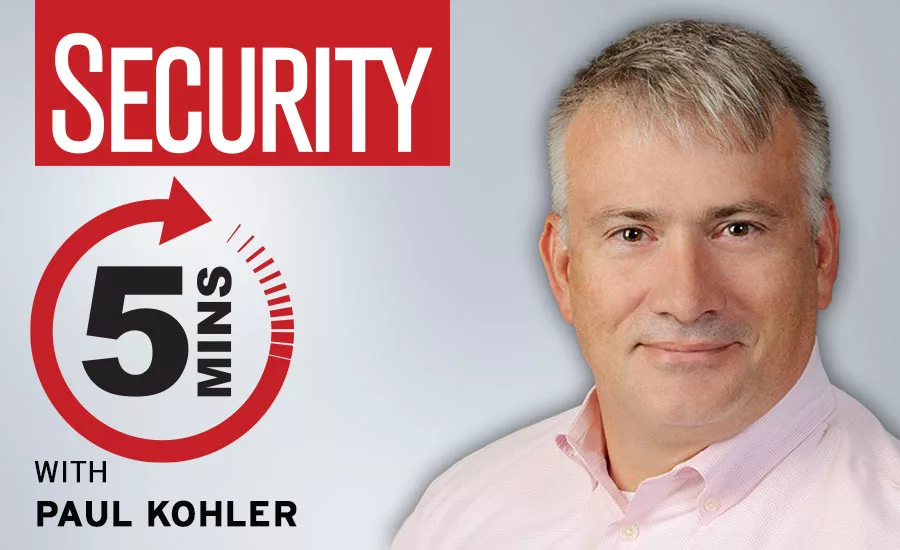5 minutes with Paul Kohler – Security concerns with contact tracing apps

A recent survey conducted among consumers and IT professionals by SecureAge Technology suggests that a majority of these groups believe COVID-19 contact-tracing technologies put individuals' personally identifiable information (PII) at risk. Generally, however, both these groups believed that these types of tools could help mitigate the spread of the disease, and would support a nationwide rollout of the technology in spite of privacy concerns. So, are contact tracing apps a 'necessary evil'? If so, what can be done to make these apps safer to protect PII and the privacy of the public? Here, we talk to Paul Kohler, Chief Technology Officer (CTO) at S3 Consulting.
Security magazine: What is your title and background?
Kohler: For the past two years, I have been the CTO at S3 Consulting, a leading provider of Identity & Access Management, Governance, Risk and Compliance and SAP Security advisory services. Prior to stepping into my role as CTO, I was the Chief Engineer at S3 where I was at the helm of design and implementation of Identity and Access Management and SAP security solutions.
Security magazine: Data privacy and personal information protection became top priorities of lawmakers, regulatory bodies, businesses, and individuals in recent years. Could the widespread rollout of contact tracing applications to fight COVID-19 derail progress in privacy laws?
Kohler: At this point no one should believe that anything they put into the public realm, will remain private. The progress made through laws and regulations will continue to enhance user privacy when applied to private businesses, however government authorities are some of the biggest abusers of personal information... As we continue to develop into a digital world, privacy is of the utmost importance and regulations need to continue to evolve with the times including COVID-19 contact tracing.
Security magazine: What are the concerns and fears associated with contact tracing apps? Are these concerns justified?
Kohler: The primary concern with contact tracing apps is the idea that someone is tracking your activities and has access to your contacts, opening yet another digital door for hackers. The current solutions through Apple and Google do not share location data, but rarely does all the information come from a single source, which results in multiple players enriching and holding your personal data. The harm is not caused by the intended purpose of the technology, rather the secondary or other applied usages that come into effect following the initial tracing purposes.
Security magazine: Could actions designed to protect the public/employees, such as contact tracing apps, result in violations of privacy?
Kohler: It is absolutely possible and actually very probable that violations of privacy will occur. Applications designed to collect information regarding location and proximity to others could be highly sought after as we continue to track the pandemic. This information combined with other personal data that individuals often broadcast on social media, can be combined to paint a clear picture of a person's activities which in the wrong hands could lead to targeted extortion attempts or for other nefarious purposes by cybercriminals. There are criminal organizations who have paid employees to aggregate this type of data thus proving that the only person who really cares about your privacy has to be you. Private businesses are paying others to collect personal data for marketing and sales purposes, tracing people in a different way. On the other hand, a recent story out of Florida reveals that a government employee who had access to volumes of personal information was using his credentials to illegally track down other individual's information. The database he used contained SSN, medical information, addresses, vehicle information, etc.
Security magazine: Is there a “right way” to roll out contact tracing apps? What are your top recommendations?
Kohler: Getting this “right” will be an uphill battle for sure. The collectors of the information must be held accountable in a very significant way for failure to protect the data that is entrusted to them. In addition, individuals need to value their data enough to demand those in possession protect it. No one should be more concerned about your privacy more than you. Participation in contact tracing is a choice in most of the free world. If someone chooses to participate, it should only be exclusively for tracking and slowing the spread of the ongoing pandemic. Users will then be responsible for opting out afterwards.
In today's world, most people have traded convenience for privacy and only the individual can move the needle back the other way. If users expressed their outrage at the lack of data protection similar to when a business operates contradictory to their personal social platforms, this wouldn't be an issue for very long.
Security magazine: Or, consider this: Are there other methods of ensuring a safe and healthy workplace that are simple and raise little concerns from a privacy standpoint?
Kohler: Absolute assurance of privacy is nearly impossible and exorbitantly expensive. In the U.S., it will require an entire shift in mindset, as there are two competing factors at play. One, we need to stop rewarding individuals who drag themselves into work on their deathbed, to get the work done. While this attitude is often welcomed by employers, it is counterproductive to a safe and healthy workplace. The stigma related to sick time needs to be removed and employees should be comfortable taking sick time when they need it. As with most problems, common sense can go a long way toward solving the problem.
Secondly, employees need to be comfortable that they are in a safe work environment where anything from the common cold to pandemic symptoms can be confidentially reported to eliminate any potential health and security concerns. The ability to internally track and report this data is important for both the privacy and safety of all involved.
Looking for a reprint of this article?
From high-res PDFs to custom plaques, order your copy today!






